Suicide Squad: Kill The Justice League sees Rocksteady's trademark world-building held back by trend-chasing
Ok Boomer(ang).
It's been a rocky start for Rocksteady's Suicide Squad: Kill the Justice League. After an initial leak, the game was officially announced by the studio in August 2020, though this arrived in the wake of sexual harassment accusations. Since then, the game was delayed, the studio's co-founders left, and reports of a battle pass became a hot debate. Last year we finally got a look at the game in action during Sony's PlayStation State of Play, but the reaction was somewhat negative and once again it was delayed. More recently, an alpha tech test took place in December but spoilery footage swiftly leaked.
"It's always disappointing when you have leaks. I think it's unavoidable in this day and age," Suicide Squad game director Axel Rydby told me at a preview event for the game. "The short answer is that it's a bummer, but at the same time, we know that the game is really good. And we know that it's a very unique game. Even though you get leaks, we just hope that it's not going to affect players' decisions to try it out."
As for the delay, Rydby said this was to polish and tighten up the game, fix bugs, and ensure that each of the four characters feels distinct in gameplay: switching between them "should feel like a new, fresh experience, but it shouldn't feel like a completely different game".
Rocksteady was also aware of what the reaction to the State of Play would be. "We knew that it was going to be a controversial game because it's not Batman," said Rydby. "But at the same time, we know that we have a really good game on our hands. And it's a very unique game that still feels like it carries the Rocksteady values in terms of tightness in mechanics and bringing the wider DC world into the game.
"Also we recognised and realised that it didn't showcase as well as we wanted to. Did it affect morale at the studio? We thought it was unfortunate. We wanted it to be received better. But at the same time, we're sort of going 'Yeah, let's show them! It's gonna be great!'"
Suicide Squad certainly does carry that Rocksteady DNA. It's a continuation of the Arkham-verse, with the same characters, artstyle, and overall moody tone. Except here players take the role of the Suicide Squad - which brings its own sense of humour - and are up against the very same Batman from the Arkham games, plus other members of the Justice League.
This isn't the exploration and melee-combat gameplay of before. Rydby described Suicide Squad as "genre defying", but really it's an open world four-play co-op shooter. Players choose between Harley Quinn, Deadshot, Boomerang, or King Shark and explore the city of Metropolis either online with three others, or in single-player with accompanying bots. And yes, it's possible to have multiple versions of characters in your squad, though they'll be substituted in story cutscenes.
Is it a live service game? As leaked earlier this year and was shown at the State of Play, the game does include a battle pass, but paid items are cosmetics only. Rocksteady reiterated this to me after the preview: regular season updates - earnable by playing and at no additional cost - will include new story content, playable characters, missions, gear, weapons, cosmetic items, and in-game events. I did spot a store in the menu during hands-on time, but details were blank - presumably these are for the paid cosmetics only.
"It's a live service game insofar as you need to be online to play it," Rydby told me, though he also confirmed an offline story mode will be introduced in the future, so internet connection won't be required.
"Really what we wanted to make with this game was build a community around it. And we want people to not only feel like part of the Suicide Squad when they play it, but also feel like part of the larger DC Universe. That's where we have a lot of social features that we're not quite ready to talk about."
In a recent earnings call David Zaslav, CEO of Warner Bros. (the studio's publisher), told investors the company planned to transform its biggest gaming franchises into "always-on" live service games. That certainly seems to be the case with the long-term support of Suicide Squad, though Rydby declined to comment on Warner's plans specifically.
"I can say that this game is very much focused on making sure that players have this sense of freedom to play the way they want to," he said. "So we're not prescribing that you have to play it with your friends, or you have to be in a group to play it. If you don't want to, you can play it solo, all the way through."
.jpg?width=690&quality=75&format=jpg&auto=webp)
First, though, players will need to choose one of four characters to control. But with such a rich comic book history of the Suicide Squad, how did Rocksteady decide on these four?
"That was, of course, a long, intense debate in the studio, because there are so many interesting [characters]," said Rydby. "And it came down to: we picked characters that had the most interesting, antagonistic relationship with the Justice League."
That's why each of the four villains has an ability taken from their hero counterpart. Boomerang can use Flash's Speed Force, for instance, while Harley Quinn uses Batman's grappling hook. Traversal mechanics therefore played a part in the decision-making too. "And then finally, King Shark: who doesn't want a shark in the group?" asked Rydby. Fair point.
Indeed, traversal is a major distinction between each character and a key factor in a player's choice. During our hands-on preview we tested all four characters in an introductory segment before settling on one. I chose Boomerang, who flings his namesake with a hold of the right bumper and then teleports to its location on release. Throw in double jumps and dashes and it's possible to scale skyscrapers with ease, before unleashing a melee attack with the boomerang and blasting with the shotgun. His moveset felt the most intuitive to me.
Other players may disagree. Deadshot uses a jetpack to hover over battles and snipe from a distance, which was simple enough to get to grips with, if a little basic. King Shark leaps Hulk-like over great distances and uses heavy weapons. Harley Quinn, for me, was the most fiddly. She can grapple up to Batman's Batwing and swing, but must press another button to actually jump off at the apex. She can also use the grapple to pull up to the edge of buildings and leap off; it's possible, therefore, to combine all these moves to continuously swing and gain momentum, but I found this especially awkward to pull off.
Of course, personality is another major factor in choosing a character and here Harley Quinn is likely to be a favourite with her sarcastic, oddball quips. Deadshot is a more stoic figure, King Shark the gormless butt of jokes, and Boomerang the eccentric wildcard.
.png?width=690&quality=75&format=jpg&auto=webp)
What's more, the four characters don't fit into typical co-op playstyles like healer or tank, but Rydby told me this is by design and was balanced through extensive playtesting. "At the start of it, what we really wanted to do is make sure that each character has their own unique traversal," he said. "So they should feel unique to play. And I think we push that as far as possible without it becoming almost like a different game when you've switched characters."
Individually the characters do feel distinct, but there's also little sense of teamwork between them. Sure, these characters are villains forced to work as a team by necessity, but playing as a group doesn't always feel like playing together. It's just four players attempting to dominate the battlefield individually.
What's more - and not to incite a clichéd Marvel vs DC debate - Marvel's Spider-Man 2 is fresh in the memory and set a high standard for superhero games (perhaps even its pinnacle) with fluid, intuitive motion and an approachable superhero fantasy. Suicide Squad, by comparison, doesn't reach that same height with its fiddly controls and characters who are likable but lack a certain thrill to embody.
The open world also compares unfavourably to Spider-Man 2. Of course, this is Rocksteady's take on a fictional city that isn't instantly recognisable - and for once this is an Arkham-verse game that gives us daylight - but Metropolis is a sprawling, vertical, polluted maze of buildings without clear routes or easily discernible landmarks. It's a backdrop to battles that's hard to navigate, unaided by a simplistic radar minimap for finding enemies and friends alike. With violent explosions, special effects, damage numbers, quest markers, and more on screen at once, it all feels a little too difficult to parse. By the time you've found enemies to shoot, your teammates probably got there first.
.png?width=690&quality=75&format=jpg&auto=webp)
At its core, though, Suicide Squad does offer some enjoyably scrappy combat. Each character has access to certain weapon types - a meaty selection of pistols, shotguns, machine guns and more - and following up a juggling melee attack with a gunshot guarantees a critical hit. Add in hits to recharge shields, counter shots, comically overpowered grenades, a Gears of War-esque reload, and a very satisfying Suicide Strike special, and the rhythm of combat quickly slots into place. It's a shame traversal doesn't quite match - at least, not without practice.
Narrative is also where Rocksteady excels. There's clear love for the source material, but reverence never hinders creativity - the studio is more than willing to put their own spin on these familiar faces. There's a wide cast of characters - both good and bad - plus a blockbuster-worthy story with brilliant performances and production, welcome diversity (I was particularly happy to see a "we welcome all heroes" Pride sign prominently included in the Justice League base), and even a tribute to Batman voice actor the late Kevin Conroy. No doubt DC fans will find plenty of Easter Eggs, but even those without prior knowledge will easily fall for the central quartet, with their prickly relationships and quippy jibes at one another.
.png?width=690&quality=75&format=jpg&auto=webp)
Wonder Woman is here too, though Rydby remains tight-lipped as to whether this particular incarnation will relate to the forthcoming game from Middle-earth: Shadow of Mordor team Monolith. "What I can say is that the Wonder Woman in our game is Rocksteady's take on Wonder Woman," he said. "And you get to see a lot of her during the game and get to know her a bit better."
It's clear Rocksteady is keen to try something new with Suicide Squad while remaining tied to the studio's past, but as an online shooter with live service elements it's perhaps trend-chasing more than sticking to what the studio does best. Its Arkham-verse lineage and characterful storytelling are strong, but this might not be the superhero fantasy you're looking for.
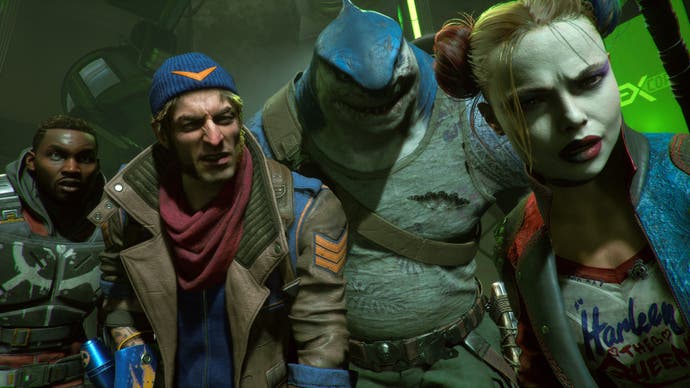

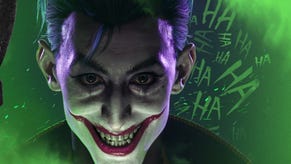
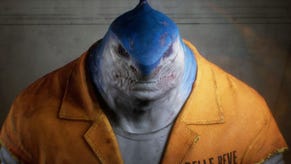
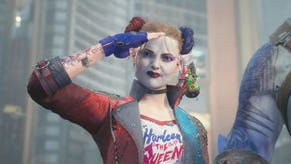
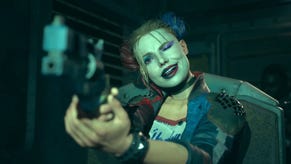
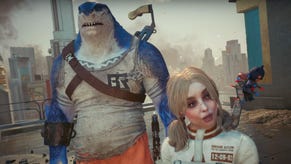
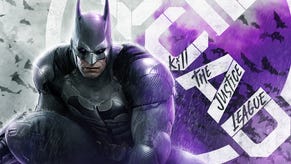
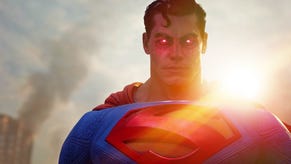
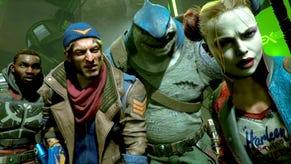



.png?width=291&height=164&fit=crop&quality=80&format=jpg&auto=webp)



